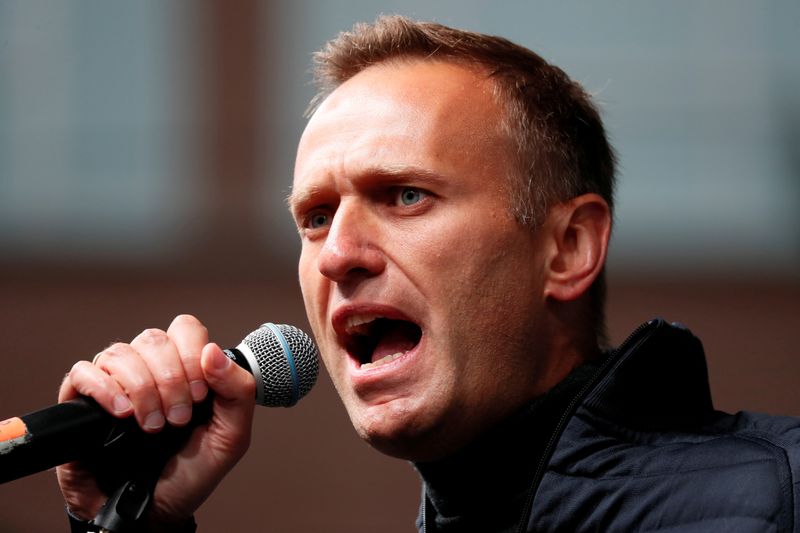By Tom Balmforth and Anton Zverev
MOSCOW (Reuters) -Jailed Kremlin critic Alexei Navalny has been moved to a sick ward with symptoms of a respiratory illness and has been tested for the coronavirus, the Izvestia newspaper reported on Monday, after he said he had a high temperature and cough.
Navalny, a prominent critic of President Vladimir Putin who declared a hunger strike last week and accused prison staff of denying him proper treatment for acute back and leg pain, alleged earlier there was a tuberculosis outbreak in his ward.
The 44-year-old politician whose release the West has demanded said three people from his ward had been hospitalised with tuberculosis and joked darkly that catching the disease might offer him relief from his other ailments.
"If I have tuberculosis, then maybe it'll chase out the pain in my back and numbness in my legs. That'd be nice," he wrote on Instagram.
He said that prison authorities had measured his temperature at 38.1 degrees Celsius (100.6 degrees Fahrenheit). He also said he had a bad cough.
Hours later, Izvestia, a pro-Kremlin newspaper, cited a statement by the federal prison service saying that he had been moved to a sick ward and had various tests, including for the coronavirus.
The Izvestia report did not say where the sick ward was, but one of his lawyers said it appeared to be within the IK-2 corrective penal colony 100 km (60 miles) east of Moscow where he was being held, the TV Rain outlet reported.
Navalny has accused prison authorities there of depriving him of sleep by waking him up hourly at night and refusing to give him proper medical care.
Prison authorities deny sleep deprivation and have said previously that Navalny's condition was satisfactory and that he has been provided with all necessary treatment. The prison holding him did not immediately respond to a request for comment on Monday.
His allies said late last week that they would stage a rolling protest outside his prison from Tuesday unless he was examined by a doctor of his choice and given what they regard as proper medicine.
Navalny's lawyers have visited him regularly in custody and have helped him continue to post messages on social media.
Amnesty International's secretary general, Agnes Callamard, said she had appealed to Putin over Navalny's "arbitrary arrest and deteriorating health condition".

"There is a real prospect that #Russia is subjecting him to a slow death. He must be granted immediate access to a medical doctor he trusts and he must be freed," she wrote on Twitter.
State media and some members of a prison monitoring group have accused Navalny of faking his medical problems to keep himself in the public eye, which Navalny and his allies deny.